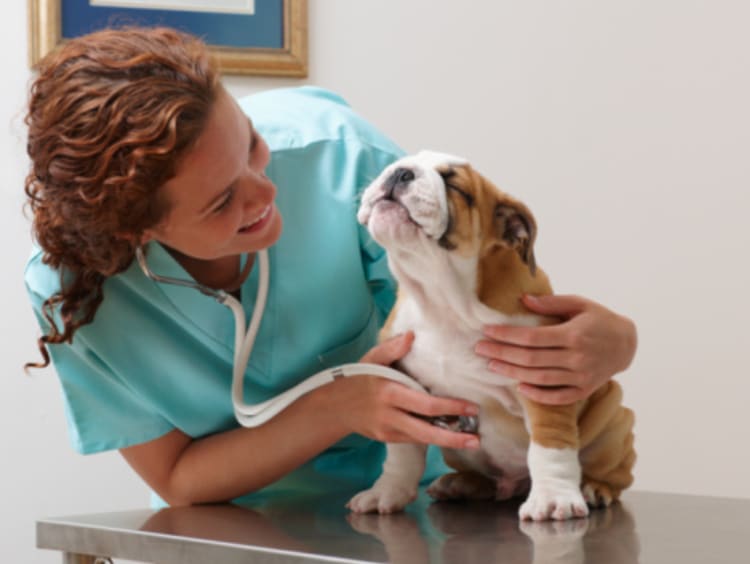When to Look for the Aid of an Emergency Vet for Sudden Health Concerns
When to Look for the Aid of an Emergency Vet for Sudden Health Concerns
Blog Article
Inoculation Guidelines From Your Trusted Vet
Inoculation standards provided by your trusted veterinarian play an essential duty in protecting your pet dog's health and wellness. In addition, dealing with typical misconceptions bordering vaccinations can additionally boost pet proprietors' confidence in these preventative procedures.

Relevance of Inoculations
Inoculations play a critical role in guarding pet dogs against a range of preventable conditions. By boosting the immune system to recognize and combat details virus, vaccinations dramatically lower the incidence of contagious conditions that can affect an animal's health and durability. Not just do inoculations protect specific animals, but they additionally contribute to herd resistance, thus reducing the total prevalence of diseases in the pet dog populace.
Timely inoculations help to alleviate the spread of illness such as rabies, parvovirus, and distemper, which can have severe effects for both family pets and humans. Vaccinations are frequently a requirement for boarding facilities, grooming services, and canine parks, making them crucial for those who wish to socialize their pet dogs.

Core Vaccines for Family Pets
While the certain vaccination demands of family pets can vary based upon individual factors, core vaccinations are widely recommended to secure against one of the most usual and severe diseases (Pet Vaccinations). Core vaccinations are those considered crucial for all pets, no matter their lifestyle or geographic area, as they secure against possibly deadly and very infectious diseases
For canines, the core vaccines include those for canine distemper, parvovirus, adenovirus (hepatitis), and rabies. Adenovirus can result in liver illness, while rabies is a zoonotic illness that presents a threat to both pet dogs and humans.
In felines, core injections include feline panleukopenia, feline calicivirus, feline herpesvirus (rhinotracheitis), and rabies. Feline panleukopenia is an extremely transmittable viral condition that influences the body immune system and intestinal tracts. Calicivirus and herpesvirus are significant factors to top respiratory infections in cats, while rabies remains an important problem for public wellness.
Seek advice from with your vet to guarantee your family pets get their core vaccinations on time.
Non-Core Vaccines Explained
Non-core injections are tailored to address specific threats connected with a pet dog's way of life, atmosphere, and exposure to particular conditions. Unlike core injections, which are widely recommended for all pet dogs, non-core injections are thought about based on specific conditions. These injections are particularly vital for pet dogs that may run into special pathogens as a result of their geographical place, travel routines, or tasks.
Examples of non-core vaccines include those for Bordetella bronchiseptica, which is linked to kennel coughing, and Lyme illness, brought on by ticks. Pet dogs that frequently connect with other pets, such as those in boarding facilities, pet dog parks, or brushing environments, might profit from see page Bordetella vaccination. If you live in an area where Lyme illness is prevalent, vaccinating versus this condition can be a prudent option for outdoor-loving pets.
Other non-core injections might include those for leptospirosis, canine influenza, and feline leukemia, depending on the certain threat elements existing. It is important to have a complete conversation with your veterinarian regarding your pet dog's lifestyle and the prospective need for these vaccines, making sure a customized inoculation approach that best safeguards your fuzzy close friend.
Vaccination Schedule Summary

As animals mature, it is essential to abide by the advised booster vaccinations. Vet Enterprise. For grown-up animals, core vaccines are typically offered each to three years, relying on the particular injection and local regulations. Non-core vaccinations may be recommended based upon way of living variables and regional disease occurrence, requiring a tailored technique
Routine vet exams are essential for upgrading inoculation timetables. Your vet can give advice on one of the most appropriate immunizations for your pet dog, considering age, wellness standing, and ecological dangers. By remaining positive and informed, pet owners can guarantee their hairy friends get prompt and efficient inoculations, therefore safeguarding their health and well-being throughout their lives.
Common Myths About Vaccines
Misunderstandings regarding family pet inoculations can bring about complication and unwillingness among pet proprietors pertaining to the booster shot process. One prevalent misconception is that visit our website vaccinations are unneeded for indoor animals. While it's real that indoor animals deal with lower dangers, they are not totally immune to diseases, as pathogens can be introduced via numerous ways, consisting of human garments and other pet dogs.
An additional misunderstanding is that vaccinations can trigger the conditions they aim to avoid. In truth, many vaccinations include suspended or attenuated virus, which can not cause condition in healthy pets. Some pet proprietors likewise think that their animals must not be vaccinated if they are currently healthy and balanced; nevertheless, inoculations are a proactive step that helps prevent the beginning of ailment.
Furthermore, numerous pet dog owners fear that injections will certainly result in long-lasting wellness problems. While negative effects can occur, they are short-lived and generally light. The benefits of vaccination-- shielding animals from potentially serious diseases-- far exceed the risks. Comprehending these usual misconceptions is crucial for responsible animal possession and making sure the wellness and safety and security of your furry buddies. Constantly consult your vet for exact details customized to your pet dog's specific needs.
Final Thought
In summary, adherence to vaccination guidelines is crucial for ensuring the wellness and long life of pet dogs. Core injections supply crucial security versus severe diseases, while non-core vaccinations attend to certain risks based on specific way of lives. Establishing a comprehensive vaccination timetable, combined with regular vet exams, assists in ideal health monitoring. Eliminating common misconceptions bordering vaccinations better strengthens the significance of educated decision-making in family pet care. Inevitably, an aggressive technique to inoculations is crucial for keeping animal health.
Not just do inoculations secure individual pets, but they likewise contribute to herd immunity, therefore decreasing the total prevalence of illness in the pet dog population.
Misunderstandings concerning pet inoculations can lead to confusion and unwillingness among family pet proprietors relating to the booster shot procedure. While it's real that indoor pets deal with lower dangers, they are not entirely immune to diseases, as pathogens can be introduced with numerous means, consisting of human clothes and various other pet dogs.
Some pet dog owners also believe that their family pets must not be immunized if they are great post to read currently healthy and balanced; however, vaccinations are an aggressive measure that assists stop the start of illness.
The benefits of vaccination-- shielding pet dogs from possibly deadly illness-- far exceed the dangers.
Report this page